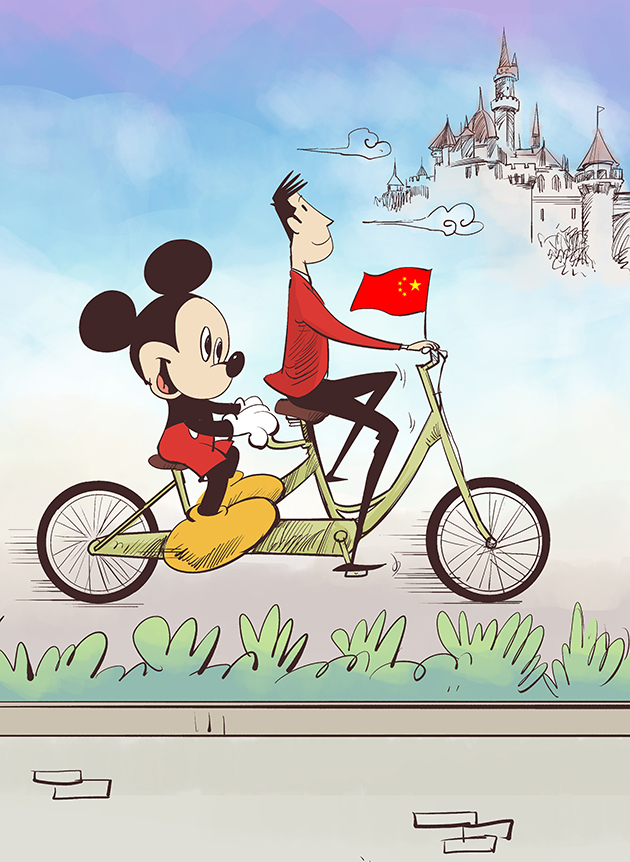Opening of Disneyland signals transition in Chinese economy

Shanghai-Disney bond
Poem by Long Yuan; Cartoon by Gou Ben
Visitors think it’s worth the time to wait in lines,
For an experience said to be sublime.
Through bilateral cultural synergy,
It is possible to release the economy’s energy.
The concept of sharing happiness and amity
Injects the park with quality and vitality.
Shanghai and Disney have had a historical bond,
And Disneyland proves this legacy lives on.
To mark the opening of Shanghai Disneyland on June 16, Chinese President Xi Jinping sent a congratulatory letter to the opening ceremony and Chinese Vice Premier Wang Yang read the letter aloud.
Wang pointed out that 2016 was designated as the “Year of China-US Tourism” during President Xi’s visit to the US last year. The opening of Shanghai Disneyland is an important activity under this framework and part of China-US cooperation.
Disney’s choice of Shanghai as the location for its latest theme park is a signal that foreign business is optimistic about China’s investment environment and market prospects. Despite the global economic downturn, foreign investment in China has been on the rise, which indicates that enterprises around the world have confidence in the business environment of China.
Some commentators have said that the opening of Shanghai Disneyland represents the shift of China’s economic focus from manufacturing to services. The theme park is thus expected to play a role in the country’s industrial restructuring.
Disney CEO Robert Iger told the media on June 15 that China is now the company’s largest market. The bond between Shanghai and Disney is not wishful thinking but rather a sign that Disney recognizes the enormous potential of the Chinese market.
The Wall Street Journal noted that overseas theme parks have generally been a weak area of business for Disney. The company has only achieved modest revenue or even losses from its parks in countries like France and Japan.
In this context, it is understandable why Disney is pinning its hopes on its venture in Shanghai, the financial center of a country with the world’s second-largest economy and a population of more than 1.3 billion.
To avoid the failures of parks in Paris and Tokyo caused by an over-reliance on American culture, Disney is pursuing a prudent approach in Shanghai.
From the start, the company hired local consultants in Shanghai to balance American culture with Chinese elements. Rarely seen in other overseas Disney theme parks, the move is considered a success, though it has been criticized by some American investment analysts as an unnecessary concession that the US made to the Chinese market. Whether it amounted to a concession or an adaption, Disney’s primary concern is gaining a foothold in the lucrative Chinese market. After all, profit from the park will offset the costs of Disney’s overall China strategy.
So what makes China attractive to Disney? First of all, some news sources predict that China will soon be the world’s largest film consumption market. PricewaterhouseCoopers (PwC) even forecasts that China will replace America as the country with the highest box office earnings.
Frozen Cinema was constructed in Shanghai Disneyland as a response to the animated film’s popularity in the Chinese market, Iger said. And the images of characters in the recent popular film Zootopia also appeared in the parade in the park.
Disney’s hopes for the Chinese tourism consumption market also prompted the opening of Shanghai Disneyland.
A report released by the UN World Tourism Organization showed that China has been the world’s largest market for outbound tourism since 2012 and is home to the world’s largest domestic tourism market. Therefore, it is only logical that the giant of the American entertainment industry is turning its eyes to the increasingly bulging wallets of the Chinese middle class.
Shanghai is one of China’s wealthiest cities. With airports, high-speed railways and expressways reaching out in all directions, it appeals to Disney because it has the potential to attract large amounts of customers from major urban centers nearby, such as Hangzhou, Suzhou and Nanjing.
Disney is still looking to the Chinese economy to reinvigorate its overseas business even as economic growth slows under the “new normal.” For China, which is transitioning from an economic model based on exports and heavy industry to one driven by consumption and services, Shanghai Disneyland represents the country’s further opening to the world. The leaders of China and the US concur that this is a mutually beneficial move.
